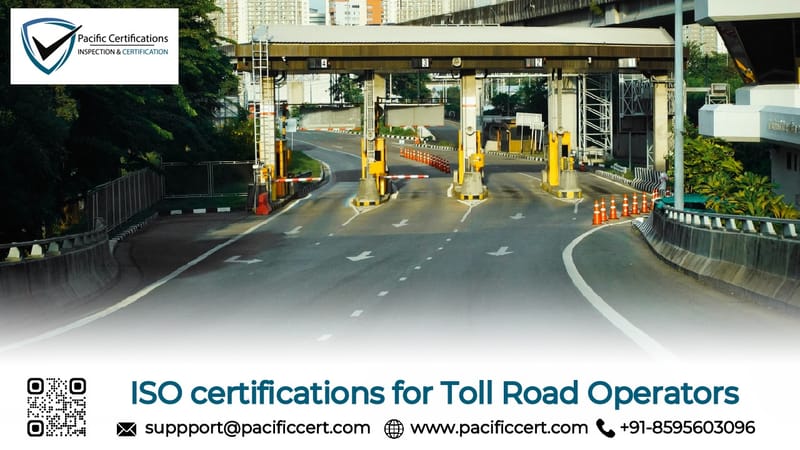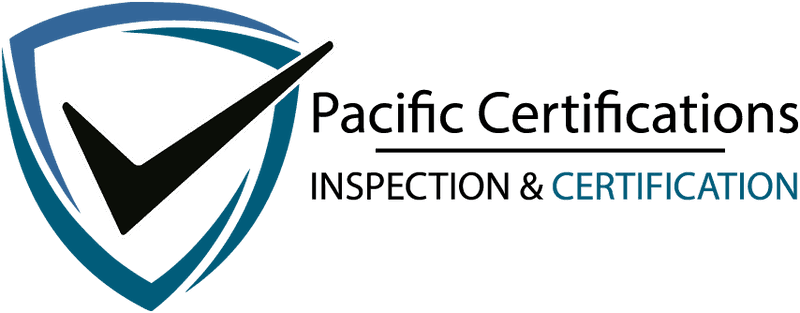ISO Certifications for Toll Road Operators, Requirements and Benefits

Toll road operators play a pivotal role in managing and maintaining vital infrastructure, ensuring efficient transportation systems. With an increasing emphasis on safety and quality, toll road operators must adopt global standards that help streamline operations while minimizing risks.
ISO certifications offer a framework to ensure that toll road operators can meet these critical goals while enhancing their safety practices and operational performance.
ISO standards are globally recognized guidelines for industries across various sectors, including transportation and infrastructure. For toll road operators, ISO certifications help ensure that operations are conducted in a systematic and sustainable manner, ultimately improving customer satisfaction and road safety.
These standards also promote accountability, transparency, and consistency in toll road management, which is crucial for infrastructure projects with long-term impacts on public safety and economic development.
Need ISO certification for your toll road operations? Contact us at [email protected] or call +91-8595603096 to get started with the certification process.
Applicable ISO Standards for Toll Road Operators
Several ISO standards are highly relevant to toll road operators, each targeting specific aspects of operational efficiency, quality management and environmental performance. The most commonly applied ISO standards include:
ISO 9001:2015 – Quality Management System
ISO 9001 focuses on providing a framework for organizations to consistently meet customer and regulatory requirements. Implementing ISO 9001 fosters a culture of continuous improvement and helps identify inefficiencies that may affect road safety or user satisfaction.
ISO 14001:2015 – Environmental Management System
ISO 14001 helps toll road operators identify and manage environmental risks, reduce their carbon footprint, and comply with environmental regulations. Implementing an environmental management system (EMS) based on ISO 14001 enhances sustainability practices, ensuring the responsible use of resources.
ISO 45001:2018 – Occupational Health and Safety Management System
ISO 45001 is a global standard for occupational health and safety (OHS) that aims to minimize workplace risks. For toll road operators, this standard helps ensure the safety of employees working on roads, in toll booths, or during road maintenance.
ISO 39001:2012 – Road Traffic Safety (RTS) Management Systems
ISO 39001 is specifically designed to improve road traffic safety. Toll road operators can utilize this standard to enhance safety protocols, reduce traffic accidents, and ensure that the roads are safe for users.
ISO 55001:2014 – Asset Management System
ISO 55001 focuses on asset management, providing toll road operators with a framework for efficiently managing road infrastructure, machinery, and other assets.
Click here to find out more applicable standards to your industry
Looking to enhance your toll road operations with ISO certification? Reach out to us at [email protected] or call +91-8595603096 for expert audit and certification services.
How Pacific Certifications Can Help
At Pacific Certifications, we specialize in providing audit and certification services for various ISO standards, including those applicable to toll road operators. Our team of experienced auditors is dedicated to helping your organization achieve ISO certification by conducting thorough, unbiased audits to ensure compliance with the selected standards.
Pacific Certifications does not provide consultancy, gap analysis, training, or implementation services. We focus solely on the auditing and certification process, offering a transparent, objective evaluation of your compliance with the relevant ISO standards.
Whether you’re seeking ISO 9001 for quality management or ISO 45001 for occupational health and safety, our certification process is designed to help you meet the rigorous standards required for compliance, improving your operations and reputation within the industry.
Ensure compliance and excellence in toll road operations with ISO certification. Contact us at [email protected] or phone +91-8595603096 for more details.
Requirements of ISO Standards for Toll Road Operators
Each ISO standard applicable to toll road operators has specific requirements that must be met to achieve certification. Below are some key requirements of the major ISO standards:
ISO 9001:2015 – Quality Management System
- Leadership and commitment: Top management must demonstrate a commitment to quality management by providing the necessary resources and creating a quality-focused culture.
- Customer focus: Toll road operators must ensure that customer needs and expectations are met, from road maintenance to toll collection services.
- Risk-based thinking: Organizations should identify potential risks and opportunities that could impact service quality and develop strategies to mitigate those risks.
ISO 14001:2015 – Environmental Management System
- Environmental policy: Toll road operators must establish a clear environmental policy and ensure it is communicated throughout the organization.
- Environmental objectives: Specific goals must be set to reduce environmental impact, such as lowering emissions or minimizing energy use.
- Compliance obligations: Operators must comply with environmental laws, regulations, and other commitments that relate to their operations.
ISO 45001:2018 – Occupational Health and Safety Management System
- Hazard identification and risk assessment: Organizations must identify workplace hazards, assess risks, and develop measures to reduce or eliminate them.
- Health and safety objectives: Operators need to establish measurable OHS goals and ensure they are integrated into operational processes.
- Training and awareness: Employees must be adequately trained on safety protocols and emergency procedures.
ISO 39001:2012 – Road Traffic Safety Management Systems
- Road safety policy: Toll road operators must establish a road safety policy that aligns with national or international safety regulations.
- Performance measurement: Organizations should collect and analyze data on traffic incidents to identify trends and implement corrective measures.
- Collaboration: Cooperation with stakeholders, such as law enforcement and emergency services, is essential for effective road traffic safety management.
ISO 55001:2014 – Asset Management System
- Asset management policy: Toll road operators must create a policy for the management of physical assets, such as roads, toll booths, and maintenance equipment.
- Risk management: Organizations need to implement a risk management approach to maintain asset performance throughout their lifecycle.
- Lifecycle management: The entire lifecycle of assets must be managed to ensure long-term sustainability and operational efficiency.
Want to improve the safety, quality, and sustainability of your toll road operations? Get in touch with us for ISO certification at [email protected] or call +91-8595603096.
Benefits of ISO Standards for Toll Road Operators
The benefits of ISO standards are significant for organizations across various industries, including toll road operators, infrastructure companies, and transportation service providers. Below is an overview of the key benefits associated with each of these standards:
- Implementing standardized processes helps organizations reduce inefficiencies, leading to streamlined operations and reduced waste.
- ISO 9001 certification is globally recognized and demonstrates an organization’s commitment to quality, making it more competitive in the market.
- ISO standards encourage a risk-based approach, allowing organizations to identify potential risks early and implement measures to mitigate them.
- ISO 14001 helps organizations meet legal and regulatory requirements related to the environment, reducing the risk of fines or sanctions.
- ISO 45001 helps organizations identify potential hazards and implement preventive measures, leading to fewer workplace accidents and injuries.
- By adopting ISO 39001, organizations can enhance safety for road users, contributing to safer transportation systems and reducing fatalities.
- ISO 55001 helps organizations reduce maintenance costs and improve the overall cost-effectiveness of their asset management processes.
ISO standards provide toll road operators and other organizations with comprehensive frameworks to enhance quality to asset management. By implementing these standards, organizations can achieve operational excellence and reduce environmental impact.
Seeking ISO certification for toll road management? We’re here to help. Contact Pacific Certifications at [email protected] or call +91-8595603096.
Market News
The toll road industry is undergoing significant transformations, with growing demands for safer, more efficient, and sustainable operations. In this year, the global trend is moving towards the integration of smart technologies in road infrastructure, allowing for real-time traffic management and predictive maintenance.
According to recent research by the International Road Federation, toll road operators are increasingly adopting ISO standards to align with sustainability goals, reduce emissions, and improve road safety. The emphasis on ISO 39001 for road traffic safety and ISO 55001 for asset management has become more prominent as operators seek to extend the lifespan of infrastructure while ensuring user safety.
Upgrade your toll road operations with ISO standards. Contact us at [email protected] or phone +91-8595603096 for audit and certification assistance.
Certification Process
The certification process for toll road operators seeking ISO certifications typically follows these key steps:
Gap Analysis (Optional but not conducted by Pacific Certifications)
Some organizations choose to perform a gap analysis to identify areas that need improvement before pursuing ISO certification.
Preparation
Organizations must prepare by gathering documentation, training staff, and implementing necessary changes to meet the ISO standard’s requirements.
Stage 1 Audit – Documentation Review
The certification body reviews the organization’s documented management system to ensure it aligns with the ISO standard's requirements.
Stage 2 Audit – On-site Assessment
Auditors visit the organization to verify that its processes and operations comply with the relevant ISO standard.
Corrective Actions
If any non-conformities are found during the audit, the organization must address them before certification is granted.
Certification
Once all requirements are met, the certification body grants the ISO certification, valid for three years. During this time, surveillance audits are conducted to ensure continued compliance.
Re-certification
At the end of the certification period, organizations must undergo a re-certification audit to maintain their ISO status.
For more information about our certification services, contact us at:
Pacific Certifications is accredited by ABIS, in case you need support with ISO certification for your Toll Road Operators business, please contact us at [email protected] or +91-8595603096.
FAQs: ISO Certifications for Toll Road Operators
Which ISO standards are most relevant to toll road operators?
The most relevant ISO standards for toll road operators are ISO 9001 (Quality Management), ISO 14001 (Environmental Management), ISO 45001 (Occupational Health and Safety), ISO 39001 (Road Traffic Safety), and ISO 55001 (Asset Management).
How long does it take to get ISO certified?
The duration varies depending on the size and complexity of your organization, but typically the certification process can take anywhere from 3 to 12 months.
Can Pacific Certifications provide consultancy services?
No, we only offer audit and certification services. We do not provide consultancy, gap analysis, training, or implementation services.
How much does ISO certification cost for toll road operators?
The cost of certification depends on factors such as the size of your organization and the scope of the certification. Please contact us for a tailored quote.
What are the benefits of ISO certification for toll road operators?
ISO certification enhances operational efficiency, improves safety, reduces environmental impact, saves costs through optimized asset management, and boosts customer satisfaction.
Read More at: Blogs by Pacific Certifications

